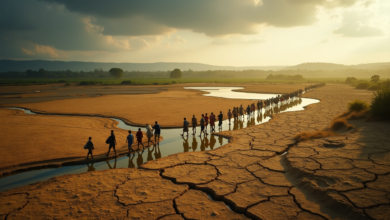
Hundreds Dead During Hajj: Saudi Arabia’s Official Report
In the sacred city of Mecca, Saudi Arabia, the annual Hajj pilgrimage is marked by devotion and reverence. However, the solemnity of this spiritual journey was recently overshadowed by tragedy, as the Middle Eastern nation confirmed a significant number of deaths amongst the pilgrims. This devastating event has cast a spotlight on the intersection of religious practice, environmental challenges, and public health within the region. The Ministry of Health in Saudi Arabia has been at the forefront, grappling with the catastrophic impact amid rising temperatures and the ongoing threats posed by climate change.
The article delves into the background of the Hajj pilgrimage, shedding light on its religious significance and the logistical challenges of accommodating millions of pilgrims in Mecca. It further explores the recent incident, including official statements from the Saudi government and an analysis of contributing factors such as the surging heat waves that have become increasingly common due to climate change. The piece concludes with a discussion on the lessons learned, highlighting the critical future precautions necessary to safeguard the health and safety of pilgrims undertaking this sacred journey. Through an examination of these elements, the article provides a comprehensive overview of the tragic events in Saudi Arabia, offering insights into the broader implications for pilgrimage practices amidst the evolving global climate scenario.
Background Information on the Hajj Pilgrimage
What is Hajj?
Hajj, a central pillar of Islam, mandates that every adult Muslim who is physically and financially capable must undertake a pilgrimage to Mecca, Saudi Arabia, at least once in their lifetime. This pilgrimage is not only a religious obligation but also a profound act of faith, known as one of the Five Pillars of Islam. The rituals of Hajj begin on the 7th day of Dhū al-Ḥijjah, the last month of the Islamic lunar calendar, and conclude on the 12th day. During this period, pilgrims perform a series of rituals that trace back to the Prophet Muhammad and even further to the Prophet Abraham and his son Ishmael, who are believed to have established the initial rites at the Kaaba.
Importance of Hajj in Islam
Hajj serves multiple spiritual and social purposes. It is a time for self-renewal and spiritual cleansing; successful completion is believed to erase past sins. The gathering of Muslims from around the world in Mecca also underscores the egalitarian spirit of Islam, promoting unity among diverse cultures and ethnicities. This pilgrimage reaffirms the faith of the participants and their submission to the will of Allah. Moreover, completing the Hajj allows Muslims to add the honorific titles of Ḥājj or Ḥajjī for males, and Ḥājjah for females, signifying their fulfillment of this profound religious duty.
Recent Incident and Official Statements
Death Toll Report
At least 1,300 individuals lost their lives during this year’s Hajj pilgrimage amid intense heat, as reported by Saudi Arabia. The Saudi Press Agency highlighted that a significant proportion of these, approximately 83%, were pilgrims without official permits, who endured long distances under harsh sunlight without adequate shelter. The fatalities primarily occurred on two critical days: June 15, during prolonged prayers at Mount Arafat, and June 16, amidst the “stoning of the devil” ritual in Mina.
Statements from Saudi Authorities
Saudi Health Minister Fahd Al-Jalajel termed the management of this year’s Hajj as “successful,” despite the high death toll. He emphasized that over 465,000 specialized treatment services were provided, including for those without official Hajj authorization. Efforts to raise awareness about the dangers of extreme heat were also noted. Al-Jalajel expressed condolences, stating, “May Allah forgive and have mercy on the deceased. Our heartfelt condolences go to their families.”
Contributing Factors to the High Death Toll
Extreme Temperatures
During the annual Hajj pilgrimage in Mecca, temperatures reached as high as 120 degrees Fahrenheit. The intense heat posed severe risks, particularly as many pilgrims, including the elderly and those with pre-existing health conditions, faced challenges in managing the extreme temperatures. The Saudi National Center for Meteorology reported daily highs between 46 degrees Celsius (117 degrees Fahrenheit) and 49 degrees Celsius (120 degrees Fahrenheit), exacerbating conditions for those performing strenuous rituals like the symbolic stoning of the devil, where some pilgrims fainted from the heat.
Unauthorized Pilgrims and Their Challenges
A significant factor contributing to the high death toll was the presence of unauthorized pilgrims. According to Saudi Health Minister Fahd bin Abdurrahman Al-Jalajel, 83% of the 1,301 fatalities were among these pilgrims who lacked official permits. Without access to organized transport and accommodations, which can cost up to $10,000, many resorted to walking long distances under the harsh sun. These pilgrims often did not have access to air-conditioned tents, misting centers, or sufficient hydration facilities, dramatically increasing their vulnerability to heat-related illnesses.
Conclusion and Future Precautions
This year’s Hajj pilgrimage in Saudi Arabia, a journey of devotion crucial to millions of Muslims worldwide, was marred by a significant tragedy, underscoring the urgent need for greater resilience against environmental challenges and improved public health measures. Through exploring the religious significance of Hajj, the unfortunate incidents leading to the loss of over a thousand lives, and the contributing factor of extreme temperatures exacerbated by climate change, the article sheds light on the complexities surrounding the management of such a large-scale religious event. It emphasizes the critical importance of adopting future precautions to ensure the safety and well-being of pilgrims, reiterating the significance of this spiritual journey in the face of evolving global scenarios.
The broader implications of this year’s events on the Hajj pilgrimage speak volumes about the intersection of faith, environmental sustainability, and global cooperation. Analyzing the measures taken by Saudi authorities and the collective grief of the Muslim community worldwide, the discussion invites reflection on how religious practices can adapt to modern challenges without losing their essence. As the world continues to grapple with climate change, the tragedy reinforces the need for ongoing research, dialogue, and action to protect those undertaking such sacred journeys. It is a call to the global community to unite in safeguarding the pilgrims’ spirit against the backdrop of an uncertain climate future, ensuring the Hajj remains a source of spiritual renewal and global solidarity.






Your point of view caught my eye and was very interesting. Thanks. I have a question for you.